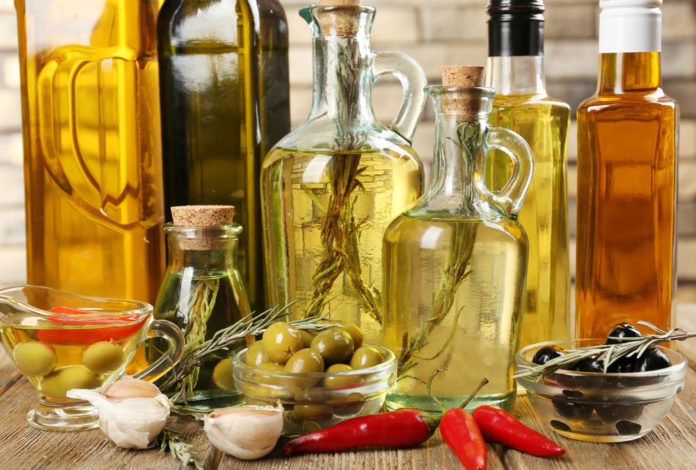What Are Fats and Oils?
Fat is among the three macronutrients, along with carbohydrate and protein. Both fats and oils each provide nine calories per gram, making it the most calorically-dense macronutrient compared to carbohydrate (four calories per gram), protein (also four calories per gram), and even alcohol (seven calories per gram). Oils are mostly broken down into saturated fat, polyunsaturated fat, and monounsaturated fat. But when it comes to the most healthful benefits, experts commonly point to oils rich in monounsaturated fat related to its ability to be cardio-protective, regulate blood sugars, and even promote weight loss. So when it comes to choosing, what are the healthiest cooking oils?
The Top 8 Healthiest Cooking Oils
1. Olive Oil
The popularity of olive oil continues to rise. Its flavor is versatile while its nutritional profile makes it an admired replacement to butter and salad dressings. Relative to its higher cost, extra virgin olive oil (EVOO) is mostly recommended when wanting to naturally highlight raw flavors, as it is unrefined and boasts higher aromas. In cooking, virgin olive oil is commonly recommended for resourcefulness purposes.
2. Canola Oil
Canola oil is valuable for its neutral flavor and high smoke point, ultimately reducing the likelihood of harsh compound creation at high heat. Though it contains lesser amounts of antioxidants compared to olive oil, it contains alpha-linolenic acid, a kind of omega-3 fatty acid. Alpha-linolenic acid may reduce inflammation associated to arthritis, inflammatory bowel disease, and cardiovascular disorders.
3. Avocado Oil
This edible oil pressed from avocadoes is boasting with benefits. Avocado and avocado oil are rich in monounsaturated fat, potassium, and valuable antioxidants such as lutein and zeaxanthin. Though it has use in cooking methods, it is meant for medium-high heat. Stay away from deep frying and use avocado oil for sautéing and baking purposes.
4. Flaxseed Oil
A type of polyunsaturated fatty acid, flaxseed oil is often used for medicinal purposes. The consumption of flaxseed oil is suggested to treat a wide variety of conditions including rheumatoid arthritis and high cholesterol as well as constipation and weight loss, mostly related to an adequate amount of healthful alpha-linolenic acid (also as mentioned in canola oil).
5. Almond Oil
Unlike most natural cooking oils, almond oil can be found in both bitter and sweet variations, making the oil quite versatile in cooking and preparation methods. The oil is rich in vitamin E, monounsaturated fatty acids, potassium and zinc. The totality of the oil may display benefits to the heart, skin, and hair!
6. Tea Seed Oil
Also known as camellia oil, tea seed oil is extracted from the seeds of tea plants. The consumption of green tea and health has been recently highlighted and now it is tea seed oil’s time to shine! Like green tea, it is a powerful antioxidant that may protect against aging and reduce LDL (or “bad”) cholesterol and triglyceride levels. The high smoke point makes it incredibly versatile for deep frying and as a salad dressing.
7. Sesame Oil
Accustomed in Asian cuisines, sesame oil is starting to become more extensively used and popularized in the U.S. It has been suggested to manage anxiety and depression related to its tyrosine (an amino acid) content. And like most oils, sesame oil is high in antioxidants that are known to fight against harmful compounds that enter and damage the body.
8. Coconut Oil
Unlike the oils listed above, coconut oil is actually a saturated fat. And though saturated fats are commonly suggested to use with caution, research has explored coconut oil’s beneficial use. While the studies were small in size, data suggests coconut oil may lead to small weight loss. Coconut oil contains medium-chain fatty acids or medium-chain triglycerides (also known as MCTs) that are thought to not become stored within fat cells like long-chain fatty acids






